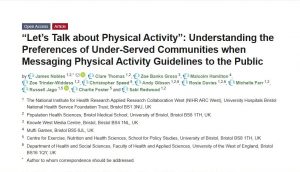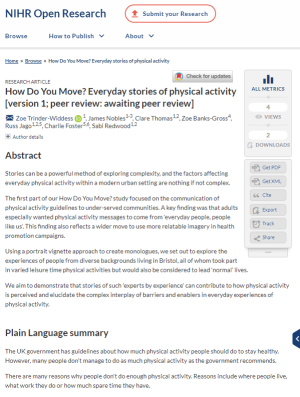Ben’s story: ‘The exercise is just a by-product’
Ben is a community activist in Bedminster, Bristol. He’s retired and spends a lot of his time working with local people to improve the neighbourhood, particularly to make it more pleasant and accessible for walking.
I loathed team sport as a child. I hated the social pressure and the need to be ‘good’ at sport. I struggled to see the point. I mean, why are so many people rushing around after this leather ball?
I was still active though. I’d always be playing out with friends, walking to my grandparents, you know, when the streets were safe for it – there wasn’t any ‘stranger danger’ or any of the traffic there is now. I think kids have lost a great deal because they are imprisoned inside – it’s no longer seen as safe to play out.
Ever since retiring 25 years ago, I’ve done a lot of walking. Walking is my way of getting around. I don’t drive anymore, and walking is often quicker and easier than getting the bus. So more than anything, the exercise is just a by-product. But I enjoy walking, it gives me time to think about things… to problem solve. It’s built into my lifestyle rather than it being something extra that I try and do. I suppose for someone of 80, I’m not doing too bad – but I certainly don’t think of myself as an athlete, put it that way. The activity helps keep pushing back the tide….
I’m also involved in a lot of community projects. Most of our community work tries to improve the walkability of the local area. If we create a pleasant environment, then it should increase people’s propensity to walk, or at least the chances of that happening. For example, we’d noticed that a lot of people were driving short distances in our community, you know, walkable distances. But we also knew that people are curious beings, they like to see what their neighbours are up to, and that’s when we started the Front Garden Awards.
It’s a simple project and we’ve managed to keep it going for the last 18 years – it doesn’t cost much. We walked around the local area and gave people whose garden seemed reasonably well kept a window bill, a sort of poster to put in their window. Over time, we noticed these window bills starting to go up in people’s windows. Not everyone was happy though – we got asked by other residents why they hadn’t received an award! It encouraged people to spruce up their gardens, and make the streets look more appealing. Now we give out about 2,500 Front Garden Awards each year and about a third go up in windows.
Everywhere you look, there are things preventing people walking in their local area. I talk to a lot of people around the community – it’s part of the reason I do this work, I enjoy the social aspect of it – and this gives me a good idea of the problems people face.
Dog dirt on the pavements stops parents from taking their prams out. Clutter on pavements and overhanging bushes make it difficult for people in wheelchairs to get around. I wanted to take my brother-in-law to the pub a few years ago – he was in a wheelchair at the time – and I kept having to push him in the middle of the road because we physically couldn’t get down the pavement. That’s not right, you know, people ought to be able to walk on the footway, that’s why it’s called the footway. Imagine being an elderly resident or having a physical impairment, it just becomes easier to stay inside, which then becomes the norm, and people end up being socially isolated. We’ve got to do better.
These are just some of the other reasons why I do so much community work. We’ve set up clutter patrols – a group of people, mostly retired, who meet every month or so to walk our local streets and look out for obstructions. You see what I mean about physical activity being a by-product, we are always out and about! The police sometimes come with us, and the local waste company. When we identify an issue, we can either raise it with enforcement in the council or we can talk it through with the people creating the obstruction.
Recently, we noticed that shops were leaving their A-boards in the middle of the pavement, meaning a pram or a wheelchair couldn’t get past. So we just spoke with the shopkeepers. Most of them thanked us for pointing it out – it works that the message comes from us rather than the council, we’re their customers at the end of the day. It’s harder to sort the problem when the council are responsible, like overhanging bushes – Public Health don’t do bushes, Transport don’t do bushes. There is a real lack of communication between the departments.
Although the voluntary and community sector is resilient, and frustration is common, it’s fragile, it needs to be nurtured and cared for. It takes a long time to build strong relationships with a community.
I think we’ve shown though what the community can do, when it comes together, to improve the walkability of the local environment. I’m happy with our progress, and my gut-feeling tells me we are doing something worthwhile.
Watch Ben’s film
This story is an extract from the NIHR Open Research paper How Do You Move? Everyday stories of physical activity.
Papers

“Let’s Talk about Physical Activity”: Understanding the Preferences of Under-Served Communities when Messaging Physical Activity
Read the paper